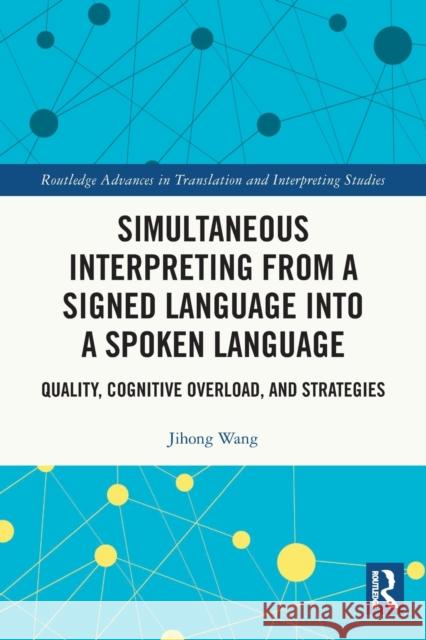Simultaneous Interpreting from a Signed Language into a Spoken Language: Quality, Cognitive Overload, and Strategies » książka
Simultaneous Interpreting from a Signed Language into a Spoken Language: Quality, Cognitive Overload, and Strategies
ISBN-13: 9780367757885 / Angielski / Miękka / 2023 / 262 str.
Simultaneous Interpreting from a Signed Language into a Spoken Language: Quality, Cognitive Overload, and Strategies
ISBN-13: 9780367757885 / Angielski / Miękka / 2023 / 262 str.
(netto: 194,67 VAT: 5%)
Najniższa cena z 30 dni: 186,33
ok. 16-18 dni roboczych.
Darmowa dostawa!
This book examines conference-level simultaneous interpreting from a signed language into a spoken language, drawing on Auslan (Australian Sign Language)-to-English simultaneous interpretation data to explore the skills, knowledge, strategies, and cognitive abilities needed for effective interpretations in this language direction.As simultaneous interpreting from a spoken language into a signed language is the widely accepted norm within the field of signed language interpreting, to date little has been written on simultaneous interpreting in the other language direction. In an attempt to bridge this gap, Wang conducts microanalysis of an experimental corpus of Auslan-to-English simultaneous interpretations in a mock conference setting to investigate different dimensions of quality assessment, interpreting strategies, cognitive load, and the interpreting process itself. The focus on conference-level simultaneous interpreting not only allows for insights into the impact of signed language variation on the signed-to-spoken language simultaneous interpreting process but also sheds light on the unique demands of conference settings such as the requirement of using a formal register.Acting as a bridge between spoken language interpreting studies and signed language interpreting studies and highlighting implications for future research on simultaneous interpreting of other language combinations (spoken and signed), this book will be of interest to scholars in translation and interpreting studies as well as active practitioners in these fields.
This book examines conference-level simultaneous interpreting from a signed language into a spoken language, drawing on Auslan (Australian Sign Language)-to-English simultaneous interpretation data to explore the skills, knowledge, strategies, and cognitive abilities needed for effective interpretations in this language direction.
As simultaneous interpreting from a spoken language into a signed language is the widely accepted norm within the field of signed language interpreting, to date little has been written on simultaneous interpreting in the other language direction. In an attempt to bridge this gap, Wang conducts microanalysis of an experimental corpus of Auslan-to-English simultaneous interpretations in a mock conference setting to investigate different dimensions of quality assessment, interpreting strategies, cognitive load, and the interpreting process itself. The focus on conference-level simultaneous interpreting not only allows for insights into the impact of signed language variation on the signed-to-spoken language simultaneous interpreting process but also sheds light on the unique demands of conference settings such as the requirement of using a formal register.
Acting as a bridge between spoken language interpreting studies and signed language interpreting studies and highlighting implications for future research on simultaneous interpreting of other language combinations (spoken and signed), this book will be of interest to scholars in translation and interpreting studies as well as active practitioners in these fields.











